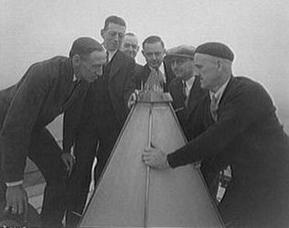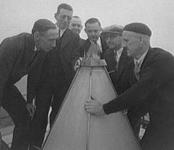Familiarity and Rarity
On
December
6,
1884,
the
construction
of
the
Washington
Monument
was
completed
when
its
apex
was
capped
with
an
eight-inch,
one-hundred-ounce
pyramid
of
aluminum,
which
was,
until
then,
the
largest
piece
of
aluminum
ever
cast.
It
might
seem
odd
that
such
an
important
national
memorial
would
be
topped
with
metal
as
common
and
cheap
as
aluminum
now
is,
rather
than
with
gold,
silver,
or
something
similarly
precious.
Yet,
at
the
time
aluminum
was
selected,
it
was
valued
at
$1.10
an
ounce,
the
same
as
the
price
of
silver.
Though
aluminum
is
one
of
earth’s
more
common
elements,
it
would
be
another
two
years
before
an
inexpensive
means
of
extracting
it
from
ore
was
finally
discovered.
Though
the
cost
of
aluminum
plummeted
from
that
point
on,
that
piece
of
aluminum,
now
made
precious
for
its
place,
still
graces
the
top
of
the
spire
overlooking the nation’s capital.
This
is
a
reminder
that
rarity
is
what
makes
something
precious.
Once
it
becomes
abundant,
it
becomes
cheap.
Silver
is
cherished
only
as
long
as
it
is
hard
to
come
by.
King
Midas’
story
teaches
that
not
even
gold
is
prized
if
it
is
everywhere
within
reach
of
one’s
touch.
Familiarity
is
the
opposite.
The
dictionary
defines
“familiar”
as
“often
encountered
or
seen;
common.”
It
comes
from
the
Latin
word
familia,
meaning
“family.”
The
connection
between
“family”
and
“familiar”
consists
in
the
fact
that
it
is
within
the
family
that
one
has
his
most
common
and
intimate
experiences
with
others.
As
a
result,
family
members
are
“familiar”
with
each
other,
and
often
not
in
a
good
way.
The
fact
is
that
items
and
people
being
that
common
in
one’s
life
can
cause
him
to
treat
them
cheaply
and
can
even
lead
to
a
breakdown
in
decorum
and
order.
Thus,
in
the
worst
cases,
“familiarity”
refers
to
the
casualness
expressive
of
disrespect
for
those
in
authority
or
even
to
the
impropriety
of
sexual
advances.
All
of
this
has
long
been
recognized
in
the
expressions,
“familiarity
breeds
contempt,”
“absence
makes
the
heart
grow
fonder,”
or
“you
don’t know what you’ve got ‘til it’s gone.”
This
kind
of
“familiarity”
can
be
observed
in
the
setting
where
the
word
originated.
Family
members
can
see
one
another
so
often
in
the
casual
setting
of
the
home
that
they
have
no
scruples
about
mistreating
one
another.
There
is
“sibling
rivalry”
and
fights
between
husbands
and
wives,
who
would
not
dare
treat
others
the
way
they
treat
each
other.
So,
familiarity
can
mean
to
treat
someone
as
not
precious,
because
one
has
interacted
with
him
or
her
so
often
that
one
no
longer
values
that
person
or
interacts
respectfully, kindly, and caringly with him or her.
Likewise,
this
same
bad
side
of
familiarity
can
be
shown
to
the
heavenly
Father.
Religious
activities
can
become
so
familiar
to
a
person
that
they
cease
to
be
special.
With
the
loss
of
novelty
often
comes
the
loss
of
reverence.
That
is
why,
if
people
go
to
church
meetings
at
all,
they
might
arrive
late,
appear
in
dirty
or
disheveled
clothing,
sleep
during
sermons,
and
even
address
God
in
prayer
as
“Daddy.”
Such
informality,
not
only
reflects,
but
can
also
foster
disrespect,
which,
in
turn,
can
encourage
a
casual
attitude
toward
obedience
to
God.
About
worship
in
the
church,
Paul
said,
“But
let
all
things
be
done
properly
and
in
an
orderly
manner”
(1
Cor.
14:40),
and
Solomon
said,
“Guard
your
steps
as
you
go
to
the
house
of
God
…
.
Do
not
be
hasty
in
word
or
impulsive
in
thought
to
bring
up
a
matter
in
the
presence
of
God.
For
God
is
in
heaven and you are on the earth …” (Eccl. 5:1,2).
So,
when
approaching
people,
one
must
keep
his
mind
on heaven, and when approaching God, his feet on earth.





“And
the
king
made
silver
as
common
as
stones
in
Jerusalem
…
.
And
all
King
Solomon’s
drinking
vessels
were
of
gold
…
.
None
was
of
silver;
it
was
not considered valuable in the days of Solomon …” (1 Kings 10:27a,21).



Click any image for slideshow
The Washington Monument viewed across the Reflecting Pool
Ramakrishna Gundra, CC BY-SA 4.0 <https://creativecommons.org/licenses/by-sa/4.0>, via Wikimedia Commons
King Midas with his daughter, from A Wonder Book for Boys and Girls by Nathaniel Hawthorne,
Edition published 1893 -Walter Crane, Public domain, via Wikimedia Commons
The partially completed monument, c. 1860
Mathew Benjamin Brady, Public domain, via Wikimedia Commons
Washington Monument nears completion around 1884
National Archives at College Park, Public domain, via Wikimedia Commons
Men examining cap on Washington Monument, January 1, 1920
"Theodor Horydczak Collection" - https://hdl.loc.gov/loc.pnp/res.100.hory
Aluminium cap with lightning rods, January 1, 1920
"Theodor Horydczak Collection" - https://hdl.loc.gov/loc.pnp/thc.5a48084
View from U.S. Capitol to Washington Monument, ca. 1920 - ca. 1950
"Theodor Horydczak Collection" - https://hdl.loc.gov/loc.pnp/thc.5a48154
Copyright © 2017 - current year, Gary P. and Leslie G. Eubanks. All Rights Reserved.
Familiarity and Rarity
On
December
6,
1884,
the
construction
of
the
Washington
Monument
was
completed
when
its
apex
was
capped
with
an
eight-inch,
one-hundred-ounce
pyramid
of
aluminum,
which
was,
until
then,
the
largest
piece
of
aluminum
ever
cast.
It
might
seem
odd
that
such
an
important
national
memorial
would
be
topped
with
metal
as
common
and
cheap
as
aluminum
now
is,
rather
than
with
gold,
silver,
or
something
similarly
precious.
Yet,
at
the
time
aluminum
was
selected,
it
was
valued
at
$1.10
an
ounce,
the
same
as
the
price
of
silver.
Though
aluminum
is
one
of
earth’s
more
common
elements,
it
would
be
another
two
years
before
an
inexpensive
means
of
extracting
it
from
ore
was
finally
discovered.
Though
the
cost
of
aluminum
plummeted
from
that
point
on,
that
piece
of
aluminum,
now
made
precious
for
its
place,
still
graces
the
top
of the spire overlooking the nation’s capital.
This
is
a
reminder
that
rarity
is
what
makes
something
precious.
Once
it
becomes
abundant,
it
becomes
cheap.
Silver
is
cherished
only
as
long
as
it
is
hard
to
come
by.
King
Midas’
story
teaches
that
not
even
gold
is
prized
if
it
is
everywhere
within
reach of one’s touch.
Familiarity
is
the
opposite.
The
dictionary
defines
“familiar”
as
“often
encountered
or
seen;
common.”
It
comes
from
the
Latin
word
familia,
meaning
“family.”
The
connection
between
“family”
and
“familiar”
consists
in
the
fact
that
it
is
within
the
family
that
one
has
his
most
common
and
intimate
experiences
with
others.
As
a
result,
family
members
are
“familiar”
with
each
other,
and
often
not
in
a
good
way.
The
fact
is
that
items
and
people
being
that
common
in
one’s
life
can
cause
him
to
treat
them
cheaply
and
can
even
lead
to
a
breakdown
in
decorum
and
order.
Thus,
in
the
worst
cases,
“familiarity”
refers
to
the
casualness
expressive
of
disrespect
for
those
in
authority
or
even
to
the
impropriety
of
sexual
advances.
All
of
this
has
long
been
recognized
in
the
expressions,
“familiarity
breeds
contempt,”
“absence
makes
the
heart
grow
fonder,”
or
“you
don’t know what you’ve got ‘til it’s gone.”
This
kind
of
“familiarity”
can
be
observed
in
the
setting
where
the
word
originated.
Family
members
can
see
one
another
so
often
in
the
casual
setting
of
the
home
that
they
have
no
scruples
about
mistreating
one
another.
There
is
“sibling
rivalry”
and
fights
between
husbands
and
wives,
who
would
not
dare
treat
others
the
way
they
treat
each
other.
So,
familiarity
can
mean
to
treat
someone
as
not
precious,
because
one
has
interacted
with
him
or
her
so
often
that
one
no
longer
values
that
person
or
interacts
respectfully,
kindly,
and
caringly with him or her.
Likewise,
this
same
bad
side
of
familiarity
can
be
shown
to
the
heavenly
Father.
Religious
activities
can
become
so
familiar
to
a
person
that
they
cease
to
be
special.
With
the
loss
of
novelty
often
comes
the
loss
of
reverence.
That
is
why,
if
people
go
to
church
meetings
at
all,
they
might
arrive
late,
appear
in
dirty
or
disheveled
clothing,
sleep
during
sermons,
and
even
address
God
in
prayer
as
“Daddy.”
Such
informality,
not
only
reflects,
but
can
also
foster
disrespect,
which,
in
turn,
can
encourage
a
casual
attitude
toward
obedience
to
God.
About
worship
in
the
church,
Paul
said,
“But
let
all
things
be
done
properly
and
in
an
orderly
manner”
(1
Cor.
14:40),
and
Solomon
said,
“Guard
your
steps
as
you
go
to
the
house
of
God
…
.
Do
not
be
hasty
in
word
or
impulsive
in
thought
to
bring
up
a
matter
in
the
presence
of
God.
For
God
is
in
heaven
and
you
are
on the earth …” (Eccl. 5:1,2).
So,
when
approaching
people,
one
must
keep
his
mind
on
heaven,
and
when
approaching
God,
his
feet on earth.
to
decide
what
they
wanted
their
gods
to
be.
Hence,
it
is
an
insidious
form
of
idolatry
for
people
to
see
Jesus
only
as
they
wish.
Many
create
a
distorted
picture
of
Jesus
by
selecting
out
of
Scripture
those
images
they
prefer
and
neglecting
the
opposite
ones
of
the
“Un-Jesus”
they
dislike.
Yet,
no
one
gets
to
accept
Jesus
only
on
the
terms
they
like.
He
must
be
accepted
in
His
totality,
or
not
at
all.
To
be
deceived
into
thinking
otherwise
will
only
lead
to
a
very
unpleasant
surprise.
“Do
homage
to
the
Son,
lest
He
become
angry,
and
you
perish
in
the
way,
for
His
wrath
may
soon
be
kindled …” (Psa. 2:12).
“And
the
king
made
silver
as
common
as
stones
in
Jerusalem
…
.
And
all
King
Solomon’s
drinking
vessels
were
of
gold
…
.
None
was
of
silver;
it
was
not considered valuable in the days of Solomon …” (1 Kings 10:27a,21).
The Washington Monument viewed across the Reflecting Pool
Ramakrishna Gundra, CC BY-SA 4.0
<https://creativecommons.org/licenses/by-sa/4.0>, via Wikimedia
Commons
King Midas with his daughter, from A Wonder Book for Boys and Girls by
Nathaniel Hawthorne, Edition published 1893
Walter Crane, Public domain, via Wikimedia Commons
The partially completed monument, c. 1860
Mathew Benjamin Brady, Public domain, via Wikimedia Commons
Washington Monument nears completion around 1884
National Archives at College Park, Public domain, via Wikimedia Commons
Men examining cap on Washington Monument, January 1, 1920
"Theodor Horydczak Collection"
https://hdl.loc.gov/loc.pnp/res.100.hory
Aluminium cap with lightning rods, January 1, 1920
"Theodor Horydczak Collection"
https://hdl.loc.gov/loc.pnp/thc.5a48084
View from U.S. Capitol to Washington Monument, ca. 1920 - ca. 1950
"Theodor Horydczak Collection" -
https://hdl.loc.gov/loc.pnp/thc.5a48154
Copyright © 2017 - current year, Gary P. and Leslie G. Eubanks. All Rights Reserved.








Click any image for slideshow











